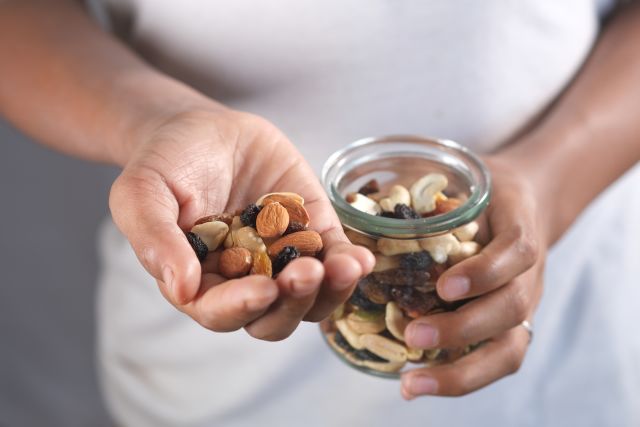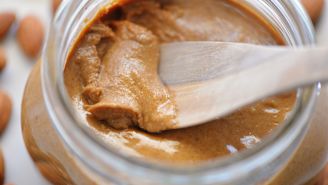Updated on January 23, 2023.
Which of the following isn’t actually a type of nut: pistachio, almond, or peanut?
Okay, that was a trick question. None of them are nuts. The first two are technically the seeds of fruits rather than “true” nuts, while peanuts are legumes. But when it comes to the ways they help keep you healthy, all of them are wise choices.
Some nuts, like almonds and walnuts, tend to get a lot of attention. But virtually any nut will offer healthy monounsaturated and polyunsaturated fatty acids, along with protein, fiber, vitamins E and K, folate, thiamine, several important minerals, carotenoids, antioxidants, and phytosterols.
Here’s why you should consider adding a 1-ounce serving of nuts to your day, every day.
Nuts protect your heart
Over the last 30 years, numerous studies have shown that nuts are good for your heart. One April 2020 analysis published in the Journal of the American Heart Association included data from more than 192,000 people. Researchers found that increasing the amount of nuts eaten by at least half a serving per day was associated with an 8 percent lower risk of developing cardiovascular disease. It was also tied to an 11 percent lower risk of stroke, regardless of how many nuts participants ate before the study began.
That said, nut eaters in the studies tended to have healthier habits—like eating a balanced diet and exercising regularly—though the study authors tried to account for these behaviors.
Nuts can help manage diabetes-related heart disease
Adding healthy monounsaturated fats to your diet can be beneficial, especially for people with diabetes—and nuts are a great source.
A March 2019 study of people with type 2 diabetes published in the journal Circulation Research found that eating five or more servings of tree nuts per week was linked to lower rates of cardiovascular disease and all-cause mortality, whether people began eating them before or after their diabetes diagnosis. The study also found that people who started eating nuts after their diagnosis still had a decreased risk of developing or dying from heart disease. For them, increased nut consumption was also tied to a 27 percent reduced risk of dying from any cause.
Nuts can help you maintain a healthy weight
Yes, nuts have lots of calories because of their fat content. (One gram of fat contains 9 calories.) But adding them to your diet does not necessarily mean you will gain weight. In fact, in a large observational study published in BMJ in September 2019, researchers found that increasing nut intake by a 1/2 serving daily (about 1/2 ounce) was associated with lower weight gain and reduced chances of becoming obese over time.
“When I’m counseling people on weight loss, I advise them to eat nuts,” says Mark Jakubicki, MS, RD, lead dietitian at St. Francis Medical Center in Trenton, New Jersey. “When you eat nuts as a snack, you feel full longer. They help you eat fewer calories overall.”
Still, it’s important to eat nuts in moderation. Try to limit yourself to 1 ounce daily, due to the caloric density. A single ounce is about 24 almonds, 14 walnut halves, 48 pistachios, 35 peanuts, 18 cashews, or 8 Brazil nuts. If you choose a nut butter, keep it to 2 tablespoons.
You can also add nuts to your diet in place of less healthy snacks or foods. Mix a few nuts into oatmeal or yogurt instead of sugary granola. Top salad with almonds or pecans instead of croutons. Add your favorite nuts to air-popped popcorn for a healthy snack. Or make a nut-crusted chicken to cut down on breadcrumbs.
Nuts may help lower cancer risk
As with cardiovascular disease, many researchers have investigated the link between nuts and cancer prevention. In one 2018 study published in the Journal of Clinical Oncology, people with stage 3 colon cancer who ate two or more servings of nuts a week had a 43 percent better chance of survival than people who ate no nuts. One theory is that eating nuts can change your genes in a cancer-fighting way; some of the compounds in nuts could influence the way your DNA behaves, which may keep cancer from developing.
Nuts enrich your gut
Prebiotics are foods, usually those high in fiber, that encourage the growth of good bacteria in your digestive system. Researchers from two meta-analyses in Nutrition Today and the Journal of Clinical Pharmacology (in 2016 and 2018, respectively) have linked these good bacteria to the prevention of numerous diseases and conditions, including obesity. The fiber in nuts can act as a prebiotic; research suggests it may boost good bacteria while inhibiting the growth of the kinds of bacteria that can contribute to disease.
Unfortunately, most people don’t get the recommended amount of fiber—depending on age, between 28 and 34 grams per day for men and between 22 and 28 grams per day for women. Adding a serving of nuts can help boost your intake of this important nutrient. A 1-ounce handful of almonds provides 3.3 grams of dietary fiber, about 13 percent of the recommended daily amount and about the same as 1 cup of brown rice.
What about nut oils?
While nut oils won’t include the fiber you get when you eat a whole nut, they offer unsaturated fats that can boost your nutrition. These oils boast the omega-3, omega-6, and omega-9 fatty acids that help protect your heart.
With the exception of peanut oil, which is commonly used for deep-frying, nut oils can be rather delicate but very flavorful, so try them in homemade salad dressings, marinades, or pesto. They can also be used to finish dishes, like a drizzle of walnut oil on pureed soups.
What if you can’t eat nuts?
A nut allergy doesn’t mean you have to miss out on all of the health benefits. Remember, as great as a serving of nuts may be for your health, you can still get pretty much everything you need from an overall well-balanced diet. For example, there are plenty of other foods that provide similar healthy fats, according to Jakubicki, including:
- Oily fish like salmon, mackerel, and sardines
- High omega-3 eggs
- Chia, flax, hemp, and sunflower seeds
- Avocado
But before you swear off nuts forever, consult your allergist. It’s possible that certain nuts could safely find their way into your diet.







